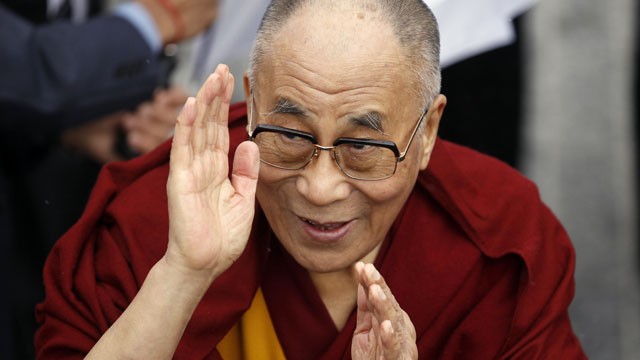Dalai Lama Pleads for Myanmar Monks to End Violence Amid Damning Rights Report

Exiled Tibetan spiritual leader the Dalai Lama greets people during a visit to Londonderry, Northern Ireland, April 18, 2013.
 Amid a damning new report showing official Myanmar complicity in ethnically cleansing entire Muslim towns and villages, the world's foremost Buddhist leader has a message to the Buddhist monks accused of spearheading the violence.
Amid a damning new report showing official Myanmar complicity in ethnically cleansing entire Muslim towns and villages, the world's foremost Buddhist leader has a message to the Buddhist monks accused of spearheading the violence.
Please stop.
The recent remarks, made by the Dalai Lama during an exclusive interview with ABC News from his home-in-exile in Dharamsala, India, represent his most public condemnation of the Buddhist-led violence that has left hundreds dead and an estimated hundreds of thousands homeless.
"It's very sad," the Dalai Lama said.
"All the major religions teach us the practice of love, compassion and forgiveness. So a genuine practitioner among these different religious traditions would not indulge in such violence and bullying of other people."
When asked what he would say if he could speak directly with Buddhist monks in Myanmar, who stand accused of exhorting followers to attack Myanmar's minority Muslims, the Tibetan leader made a personal plea.
"We are religious people," he said earlier this month, gesturing to his Saffron colored robes.
"Buddha always teaches us about forgiveness, tolerance, compassion.
"If from one corner of your mind, some emotion makes you want to hit, or want to kill, then please remember Buddha's faith. We are followers of Buddha."
It's unclear how much weight the Dalai Lama's words will carry in violence-stricken areas of Myanmar (formerly known as Burma), where a new report accuses Buddhist monks, political party operatives, and ordinary Myanmar residents of committing brutal acts of violence against the country's tiny Rohingya minority.
The report, issued by Human Rights Watch, shows a pre-planned pattern of violence in the Southeast Asian country, including entire villages razed to the ground and the bodies of men, women and children buried in mass graves, some with their hands bound behind their backs. In another village, 70 people, including 28 children, were allegedly hacked to death.
It's unclear whether Myanmar has responded to the report.
The violence, which began during the summer of 2012 as a series of small skirmishes between Buddhists and Muslims in central Myanmar, has spread considerably. Nearly all the violence has been directed toward Myanmar's minority Rohingya Muslims, a small ethnic group that represents no more than 3 to 5 percent of Myanmar's total population.
The Myanmar government classifies the Rohingyas as Bangladeshi immigrants, denying them official citizenship. Burmese laws prevent them from travelling without permission and owning land.
Recent satellite photos released by Human Rights Watch show a huge scale of destruction: During a three-day period in March, more than 800 buildings in a single Burmese village, mostly in Rohingya neighborhoods, were completely destroyed.
Several residences were also reduced to ash, suggesting arson as a widespread tactic. Many of those who fled now live in overcrowded camps where they lack sufficient access to water, food, shelter and medicine.
Human Rights Watch accuses Burmese authorities of turning a blind eye, and in some cases participating in the violence. It accuses the government of "systematically restricting humanitarian aid" and "imposing discriminatory policies" on its Muslim minority, warning of a humanitarian crisis if the violence isn't brought to an end.

